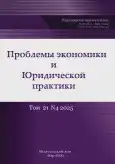The category of exclusive rights in Russian legislation: historical genesis
- Authors: Ryabzin R.A.1
-
Affiliations:
- Supreme Court of the Russian Federation
- Issue: Vol 21, No 4 (2025)
- Pages: 60-68
- Section: Private Law (Civil) Sciences
- URL: https://journal-vniispk.ru/2541-8025/article/view/316451
- DOI: https://doi.org/10.33693/2541-8025-2025-21-4-60-68
- EDN: https://elibrary.ru/UZGICJ
- ID: 316451
Cite item
Abstract
The article briefly illustrates the stages of formation and development of legislation and doctrinal ideas about intellectual property law and, in particular, about exclusive rights. A brief digression into the history of the emergence and development of exclusive rights to the results of intellectual activity and the means of individualization equated to them allowed the author to draw certain conclusions that should be taken into account when new objects of civil rights appear. First of all, we are talking about the so-called virtual objects (virtual property). The law somehow coped with their appearance through existing legal institutions and tools used, sometimes using analogy, and in some cases "squeezing" new objects into already established concepts and institutions. However, the experience of the formation and development of intellectual property norms in Russian law has clearly shown an absolutely normal desire to apply the old to everything new. Therefore, it is not surprising that scientists are trying to extend the property law regime or intellectual property law to such objects.
Full Text
##article.viewOnOriginalSite##About the authors
Roman A. Ryabzin
Supreme Court of the Russian Federation
Author for correspondence.
Email: rodinzonrom@mail.ru
Cand. Sci. (Law), Judge
Russian Federation, MoscowReferences
- Glonina V.N. Intellectual property and fundamental human rights: what is the role of the ECHR in achieving a balance of interests? // Russian Yearbook of the European Convention on Human Rights / Russian Yearbook on the European Convention on Human Rights. No. 4 (2018): "The role of precedent in the interpretation of the European Convention on Human Rights." Moscow: Development of Legal Systems, 2018. 672 p.
- Civil and commercial law of foreign countries / Under the general editorship of V.V. Bezbakh and V.K. Puchinsky. Moscow: MTsFER, 2004. 893 p.
- Civil law / E.S. Boltanova, N.V. Bagrova, T.Y. Barishpolskaya et al.; edited by E.S. Boltanova. Moscow: INFRA-M, 2023. 515 p.
- Dozortsev V.A. Intellectual rights: The concept. System. Tasks of codification: Collection of art. Moscow, 2003. 416 p.
- Kartskhiya A.A. Russian intellectual property rights holders in the WTO. Law Enforcement Monitoring. 2012. No. 4. Pp. 49–56.
- Kirsanova E.E. Legal regulation of the turnover of intellectual property rights in the digital economy: a monograph. Moscow: Justicinform, 2022. 228 p.
- Labzin M.V. Scientific concepts of understanding intellectual property law. Patents and Licenses. Intellectual Property Rights. 2014. No. 8. Pp. 57–68.
- Levchenko N.P. Is Part four of the Civil Code of the Russian Federation necessary? EZH-Yurist. 2006. No. 19.
- Mozolin V.P. On the concept of intellectual property rights. Journal of Russian Law. 2007. No. 12. Pp. 100–209.
- Murzin D.V. The exercise of the exclusive right to the results of intellectual activity: the admissibility of the analogy of norms on property rights. Journal of the Intellectual Property Rights Court. 2019. No. 24. Pp. 5–15.
- Novoselova L.A., Rozhkova M.A. Intellectual property: some aspects of legal regulation: monograph. Moscow: Norm, INFRA-M, 2014. 128 p.
- Pilenko A.A. The right of the inventor. Moscow: STATUTE, 2001. 688 p.
- Pilenko A.A. The right of the inventor. Privileges for inventions and their protection in Russian and international law. Historical and dogmatic research. Vol. I–II. St. Petersburg, 1902–1903. 404 p.
- Intellectual property law / E.V. Badulina, D.A. Gavrilov, E.S. Grin and others; under the general editorship of L.A. Novoselova. Moscow: Statute, 2017. Vol. 1: General provisions. 512 p.
- Savelyev A.I. Cryptocurrencies in the system of objects of civil rights. Law. 2017. No. 8. Pp. 136–153.
- Shershenevich G.F. Copyright in literary works. Kazan, 1891. 313 p.
Supplementary files








